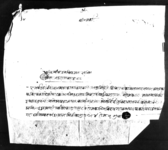A purjī from C-in-C General Bhīma Śamśera Jaṅga Rāṇā Bahādura to the Guṭhī Bandobasta Aḍḍā re bidding farewell to ascetics after Śivarātrī (VS 1962)
ID: K_0230_0035
Edited and
translated by Rajan Khatiwoda, Christof Zotter
Created: 2017-08-25;
Last modified: 2021-08-11
For the metadata of the document, click here
The accompanying edition, translation/synopsis and/or commentary are available under the terms of the Creative Commons Attribution-ShareAlike 4.0 International License
Abstract
This note (purjī) from Commander-in-Chief Bhīma Śamśera Jaṅga Rāṇā Bahādura to the chief and staff of the Guṭhī Bandobasta Aḍḍā under His Majesty (Śrī 5 Sarkāra) directs the addressees to make necessary arrangements for taking leave of ascetics and other pilgrims who visited the Paśupatinātha temple during Śivarātrī in VS 1962.Diplomatic edition
[1r]
1श्री\1श्री५सर्कार2१[Seal of Bhīma Śamśera Jaṅga Rāṇā Bahādura]1श्रीकम्यांडरइनचिफजनरलभिम
2सम्सेरजङ्गराणावहादुरवाट1 ¯ ¯१ ¯तर्फगुठीवंदोवस्तअडाकाहाकिम्कारींदालेपुर्जिहेरी•शिवरात्रीकामेलालाइनेपाल्आय़ाका
2फकिरफकेडादेसीपरदेसीमानीस्हरूलाइसिवरात्रीपछीफागुणसुदी२रोजकादिनसम्ममाफर्का
3इपठाउनुपर्न्येहुनालेअषडाअषडाकामहंतहरूलाइस्मेत्उर्दिदीनुविदालाइपनीवेलैमावंदोव
4स्तमिलाइदुरुस्तगरीराषीसोफागुणसुदी२रोजकादिनविदाइगराउनल्याइफर्काइपठाउनेकाम
5गर•इतीसम्वत्१९६२सालमितीफागुणगते४रोज•५शुभम्¯¯¯¯¯¯¯¯¯¯¯¯¯[Unknown seal]
Translation
Śrī 5 Sarkāra – 1
[Seal of Bhīma Śamśera Jaṅga Rāṇā Bahādura]
From the venerable Commander-in-Chief General Bhīma Śamśera Jaṅga Rāṇā Bahādura
Since ascetics1 and (other) persons, [both] native [and] foreign, 2 who have come to Nepāl3 for the Śivarātri festival are to be sent back after Śivarātrī by the 2nd of the bright fortnight of Phālguṇa, the chief officer (hākima) and the clerks (kārindā) of the Guṭhī Bandobasta Aḍḍā under His Majesty (Śrī 5 Sarkāra), having read [this] purjī, shall send a [corresponding] notice to the akhāḍās and the abbots (mahanta) of the akhāḍās. Make timely arrangements, doing what is appropriate for the leave-taking, and having assembled [the pilgrims] to have them take their leave on the 2nd of the bright fortnight of Phālguṇa, send [them] back.
Thursday, the 4th solar day (gate) of Phālguṇa in the [Vikrama] year era 1962 (1906 CE). Auspiciousness.
[Unknown seal]
Commentary
Śivarātrī or Mahāśivarātrī on the 14th day of the dark fortnight of Phālguna4 is one the most important Hindu festivals, especially for śaivas. At the Paśupatinātha temple in Deopatan, the national sanctuary of Nepal since the time of the Malla kings, huge crowds of pilgrims and ascetics gather on this annual occasion. The Guṭhī Saṃsthāna keeps numerous other records relating to the treatment of ascetics during the Śivarātrī festival of VS 1962 (and not just at Paśupatinātha): sanadas and purjīs regarding the contribution of alms and food (haṇḍī or sadābarta),5 the supply of firewood6 and gā̃jā7 , the repairing of resting places,8 the organization of banquets (bhaṇḍārā)9 etc.
The present document has to do with to the final phase of this administrative "labour peak". Three days after the actual festival, the visitors receive a boon and are sent away.
In later times, the distribution of firewood, food, etc. was done by the clerks of the successor organization of the Guṭhī Bandobasta Aḍḍā, the Guṭhī Saṃsthāna, and in order to participation in the official farewell at Kālamocanaghāṭa one needed a special ticket (Michaels 1994: 272f. and Michaels 2008: 37).10

